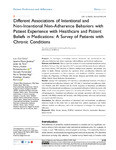Mostrar o rexistro simple do ítem
Different associations of intentional and non-intentional non-adherence behaviors with patient experience with healthcare and patient beliefs in medications: a survey of patients with chronic conditions
| dc.contributor.author | Cea-Calvo, Luis | |
| dc.contributor.author | Marín-Jiménez, Ignacio | |
| dc.contributor.author | De-Toro, Javier | |
| dc.contributor.author | Fuster-RuizdeApodaca, María J. | |
| dc.contributor.author | Fernández, Gonzalo | |
| dc.contributor.author | Sánchez-Vega, Nuria | |
| dc.contributor.author | Orozco-Beltrán, Domingo | |
| dc.date.accessioned | 2022-05-12T10:29:04Z | |
| dc.date.available | 2022-05-12T10:29:04Z | |
| dc.date.issued | 2020-12-14 | |
| dc.identifier.citation | Cea-Calvo L, Marín-Jiménez I, de Toro J, Fuster-Ruizdeapodaca MJ, Fernández G, Sánchez-Vega N, et al. Different associations of intentional and non-intentional non-adherence behaviors with patient experience with healthcare and patient beliefs in medications: a survey of patients with chronic conditions. Patient Prefer Adherence. 2020;14:2439-2450 | es_ES |
| dc.identifier.issn | 1177-889X | |
| dc.identifier.uri | http://hdl.handle.net/2183/30651 | |
| dc.description.abstract | [Abstract] Purpose: To investigate relationships between intentional and non-intentional non-adherence behaviors and patient experience with healthcare and beliefs in medications. Patients and methods: This is a post hoc analysis of a cross-sectional anonymous survey distributed between May and September 2017 to patients with rheumatic disease, inflammatory bowel disease, HIV infection or diabetes mellitus from outpatient and primary care clinics in Spain. Patients answered five questions about non-adherence behaviors and completed questionnaires on their experience with healthcare (IEXPAC: Instrument to Evaluate the EXperience of PAtients with Chronic diseases) and beliefs about medicines (BMQ: Beliefs About Medicines Questionnaire). Results: Among 1530 respondents, 53% showed ≥1 non-adherence behavior; 35% had ≥1 non-intentional non-adherence behavior, and 33% had ≥1 intentional non-adherence behavior. Patients with HIV infection had the lowest frequency of intentional non-adherence behaviors. Non-intentional non-adherence was associated with patient beliefs (inversely with BMQ overall score) and patient experiences (inversely with IEXPAC Factor 3 sub-score, self-management). Intentional non-adherence was strongly associated with beliefs scores (directly with BMQ concerns and inversely with BMQ necessity sub-score) and inversely associated with HIV infection. Conclusion: The different associations of intentional and non-intentional non-adherence behaviors found in this study help to understand how patient experiences and beliefs influence medical non-adherence, and in the development of strategies for reducing non-adherence. | es_ES |
| dc.language.iso | eng | es_ES |
| dc.publisher | Dove Press | es_ES |
| dc.relation.uri | https://doi.org/10.2147/ppa.s281985 | es_ES |
| dc.rights | Atribución-NoComercial-SinDerivadas 3.0 España | es_ES |
| dc.rights.uri | http://creativecommons.org/licenses/by-nc-nd/3.0/es/ | * |
| dc.subject | BMQ | es_ES |
| dc.subject | IEXPAC | es_ES |
| dc.subject | Chronic disease | es_ES |
| dc.subject | Intentional behavior | es_ES |
| dc.subject | Medication adherence | es_ES |
| dc.subject | Patient beliefs | es_ES |
| dc.title | Different associations of intentional and non-intentional non-adherence behaviors with patient experience with healthcare and patient beliefs in medications: a survey of patients with chronic conditions | es_ES |
| dc.type | info:eu-repo/semantics/article | es_ES |
| dc.rights.access | info:eu-repo/semantics/openAccess | es_ES |
| UDC.journalTitle | Patient Preference and Adherence | es_ES |
| UDC.volume | 14 | es_ES |
| UDC.startPage | 2439 | es_ES |
| UDC.endPage | 2450 | es_ES |
Ficheiros no ítem
Este ítem aparece na(s) seguinte(s) colección(s)
-
INIBIC-TCMR - Artigos [102]






